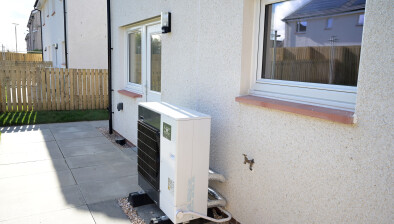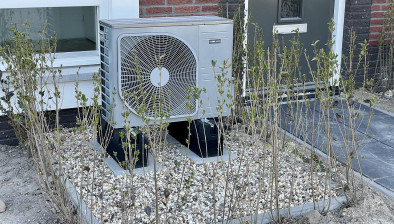Government unveils extra £20m for energy efficiency and reaffirms £4.5bn infrastructure commitment

The Scottish Government has announced an extra £20 million to address fuel poverty and energy efficiency.
Setting out the Scottish Government’s budget to parliament yesterday, deputy first minister John Swinney said the plans respond to Scotland’s improving economic conditions and would enhance economic growth, tackle inequalities and continue to protect and invest in Scotland’s public services.
Key additions to the original budget included an increased investment in energy efficiency of £20m as well as £3.9m to support cycling and walking infrastructure.
£6m is earmarked for home energy efficiency programmes that will support measures such as solid wall, cavity or loft insulation while an additional £14m will be invested in low cost home energy efficiency loans available to households in the private sector to supplement existing grant schemes to help install energy efficiency measures.
The government also reaffirmed its commitment to secure £4.5 billion of infrastructure investment in 2015-16, to support £330m of further capital investment in its Scotland’s Schools for the Future programme through NPD funding and to provide £140m to deliver two new college campuses through the NPD pipeline.
The additional funding will take the Scottish Government’s investment to tackle fuel poverty and boost energy efficiency to £114m in 2015/16 and to around £300m over the three years 2013/14 to 2015/16.
Details of the loan schemes will be announced in due course.
It follows a report, released in late 2014, that found fuel poverty levels had reached 39 per cent in Scotland.
Social justice secretary Alex Neil said the funding demonstrates the government’s determination to tackle fuel poverty and improve energy efficiency head on.
He said: “Fuel costs have risen six times faster than incomes since 2003. In 2013, fuel prices rose by seven per cent, pushing more people into fuel poverty. The fact that this is happening in an energy-rich country is outrageous.
“Given the recent reductions in energy costs, all energy providers must implement price cuts now and not wait until the Spring.
“This additional funding means we have allocated over half a billion pounds since 2009 to make Scotland’s homes more energy efficient.
“Over 700,000 households have benefited from measures like new boilers or insulation targeted in particular at those in or at risk of fuel poverty.”
The announcement has been warmly received though calls remain for even more action to tackle “the scourge of fuel poverty”.
David Ogilvie, head of policy and public affairs at CIH Scotland, said: “We welcome this extra funding for energy efficiency and the recognition that a warm, safe home should not be the privilege of a few but the normal standard of healthy living across Scotland.
“However, much more still needs to be done to tackle the scourge of fuel poverty – and investing in energy efficiency can help the Scottish Government make significant savings to other budgets such as health and social care in the longer term.”
The Scottish Federation of Housing Associations (SFHA) said the money is a step in the right direction.
David Stewart, SFHA policy manager, said: “News of the additional £20m is positive, and the SFHA welcomes this funding which is a step in the right direction. Investing in domestic energy efficiency is vital if Scotland is to start to address the scourge of fuel poverty and to work towards meeting our ambitious climate change targets.
“We know from research that investing in the energy efficiency of the nation’s homes is the most effective way to reduce fuel poverty, address climate change and create jobs and training opportunities. We, therefore, welcome the news of this increased investment, which the SFHA has consistently called for.”
Mr Stewart added: “However, we note that (Mr Swinney) acknowledged that the £114m will not be sufficient to end fuel poverty or to ensure that Scotland’s climate change targets are met. We, therefore, hope that this investment sees the start of energy efficiency being treated as a key priority for investment in order to create jobs, cut fuel poverty and reduce carbon emissions.
“Housing associations and co-operatives, with their groupings of housing and their expertise in capital investment, are ideally placed to lead on programmes to improve the energy efficiency of Scotland’s homes.”
For the Existing Homes Alliance Scotland, energy efficiency has a very important influence in eradicating and reducing the risk of fuel poverty in the future by creating homes that are warm, affordable to heat, and low carbon.
Alan Ferguson, chair of the Existing Homes Alliance Scotland said the investment will save money for ordinary households struggling to pay their bills, but also for the NHS, by reducing the health impacts associated with cold and damp homes. Furthermore, he said the extra funding will help create and maintain jobs in the insulation industry, giving them more certainty and stability to plan their investments.
Alan Ferguson said: “We are pleased to see additional funding put towards energy efficiency. This investment is very welcome indeed given the recent Scottish Government figures which show fuel poverty is on the rise – up to a startling 39 per cent of Scottish households (940,000). Scotland has a target to eradicate fuel poverty by 2016, and every effort should be made to turn round the current backwards trend and eliminate this unnecessary burden on the Scottish people.”
He added: “The additional funding will go part way towards plugging the gap left by reductions to the UK government’s Energy Company Obligation funding, which the Scottish Government predicted would mean a fall in energy efficiency investment for Scotland by £50m per year. However, we firmly believe still more needs to be done to compensate for these losses, and we look forward to working with the Scottish Government to step up the pace and scale of change to the energy performance of Scotland’s homes in the coming year. This would include making energy efficiency a major national infrastructure priority – a vision of warm and cosy homes that everyone can afford to enjoy.”
Homes for Scotland said the money is key to meeting the budget’s aims of tackling social inequality caused by fuel poverty but the trade body still waiting on full details of £125m supply funding announced last October.
Chief executive Philip Hogg said: “New homes built to today’s standards have already reduced their carbon emissions by over 70 per cent on 1990 levels and are extremely energy efficient, offering potential significant savings on running costs.
“With even tougher standards effective from October this year, the home building industry clearly has a fundamental role to play in tackling fuel poverty, addressing climate change and improving the energy efficiency of Scotland’s housing stock.
“Our members stand ready to work with the Scottish Government to help deliver enough warm, sustainable homes for everyone and achieve a more equitable society but, with housing production still languishing at its lowest level for 70 years, the industry still needs significant support and we still await full details of how the outstanding balance of the £125m to support housing supply that was announced last October will be allocated.”














